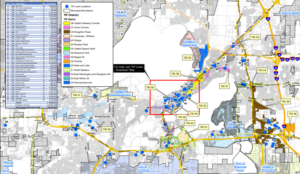Note: Sunshine Week was launched in 2005 by the then-American Society of Newspaper Editors. It is designed to draw attention to the perils of a secretive government and the critical importance of an open, transparent government. This year, Good Jobs First celebrates by highlighting places modeling great transparency around economic development incentives and corporate behavior.
Transparency is too often an afterthought in local economic development. That’s why, in our ongoing survey of small- and medium-sized cities’ economic development practices, Madison, Wisconsin, stands out for its commitment to openness in administering its Tax Increment Financing (TIF) program.
Madison’s TIF webpage sets a high standard for others to emulate, presenting the city’s TIF policies alongside up-to-date maps and detailed financial data tracking TIF payments. Each active Tax Increment District (TID) boasts its own subsection, complete with the latest project plan and a concise history of any amendments.

While these elements can sometimes be found in fragments on other cities’ websites, Madison’s comprehensive approach makes it easy for residents to see how public money is being spent to support private projects.
So far, our survey has found that most places disclosing subsidy deals bury this information in archived meeting records from various public bodies, which means residents must know beforehand when the project was approved and have enough details to identify the appropriate document.
For us at Good Jobs First, that’s not disclosure. Meeting agendas and minutes often lack crucial details, such as the name of the incentivized company. True transparency should consider the ease of accessing and interpreting information, which, at a minimum, means compiling all the deals in one place.
It’s not just posting deals as they are announced. Outcomes matter most. So ideally, every city’s economic development team should have adequate resources to monitor subsidy deals and hold companies accountable for their commitments. In reality, we know many development officials face staffing constraints that mean subpar follow-up reporting.
However, Madison’s Economic Development Division, managed by a team of just three staff members, proves that transparency is possible despite limited resources. Madison demonstrates how smaller cities can provide detailed disclosure in a user-friendly format.
The benefits of increased transparency are not one-sided. Both concerned community members and local government employees stand to gain. A robust project reporting system can streamline the workload for economic development staff, serving as an external repository for digital record-keeping. This is especially crucial during political transitions when staff tends to turn over.
By embracing a holistic approach to reporting on TIF districts, Madison demonstrates that even with a small team, maintaining organized and accessible records is not only achievable but essential for fostering trust and accountability in local government.
Read more
Sunshine Week: Transparency Portals Show It Can Be Done (more easily than you think)
Sunshine Week: Oregon EZ Program Lets You See Into the Future and Into the Past
Sunshine Week: Philadelphia Transparency Spurs Reductions in Corporate Tax Breaks
Sunshine Week: The Golden State (California) Gets a Gold Star